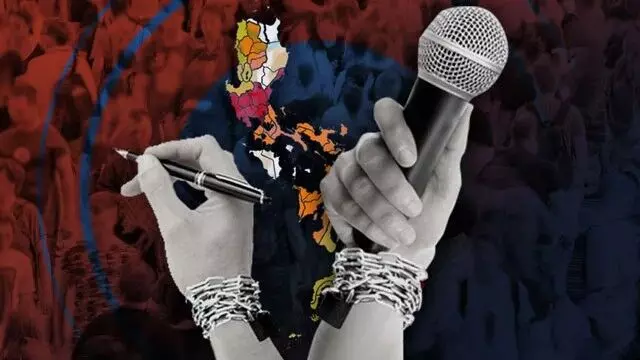
Press bodies urge Modi Govt to repeal press-restricting laws
text_fieldsPress bodies and digital rights organizations in India have called on Prime Minister Narendra Modi's government to repeal several laws they claim are infringing on press freedom.
The demand came after a consultative meeting organized by the Press Club of India and attended by various regional press clubs and advocacy groups, including the Delhi Union of Journalists, Indian Women's Press Corps, Digipub News India Foundation, and the Internet Freedom Foundation.
The resolution passed during the meeting highlights concerns over several new laws and amendments, which the participants argue are designed to stifle the press. Among these are the Broadcast Services (Regulation) Bill, 2023, the Digital Personal Data Protection Act, 2023, the Press and Registration of Periodicals Act, 2023, and the Information Technology Amendment Rules, 2023.
These laws provide the government with the power to remove any online content it deems false or misleading, a measure viewed by press advocates as a tool for silencing dissent.
Particularly contentious is the Broadcast Services Regulation Bill, 2023, which seeks to replace the Cable TV Networks (Regulation) Act, 1995. This bill extends regulatory oversight to Over-The-Top (OTT) platforms and digital content, requiring mandatory registration and the establishment of content evaluation committees for self-regulation. A proposed three-tier regulatory system is also part of the bill, raising concerns about increased government control over digital media.
The resolution asserts that the right to information is paramount and must not be compromised. It criticizes the frequent internet shutdowns, which impede citizens' access to information and hinder journalists' ability to report. The press bodies emphasized the need for journalists to defend their rights under Article 19(1)(a) of the Indian Constitution, which guarantees freedom of speech and expression.
The Digital Personal Data Protection Act, 2023, also came under scrutiny for its impact on the Right to Information (RTI) Act, 2005. An amendment aligning Section 8(1)(j) of the RTI Act with Section 44(3) of the Digital Personal Data Protection Act is seen as a move to weaken a vital tool for journalists seeking information about government and public servant activities. The press bodies called for the removal or amendment of these provisions to preserve the integrity of the RTI Act.
Furthermore, the resolution advocated for replacing the Press Council of India with a Media Council that includes broadcast and digital media. This new council should be composed of working journalists, union representatives, media owners, and government officials, and be empowered to issue strictures against media houses and regulate content across various platforms.
Concerns were also raised about the government's intention to repeal the Working Journalists Act and Other Newspaper Employees (Condition of Service) and Miscellaneous Provisions Act, 1955, and the Working Journalists (Fixation of Rates of Wages) Act, 1958. These acts, which address wages, working hours, and job security for journalists, have been subsumed by the Occupational Safety, Health, and Working Conditions (OSH) Code, 2020. The resolution demands the restoration and amendment of these acts to include protections for broadcast and digital journalists.
The meeting underscored the need for a modern legal framework that balances personal data protection with freedom of expression and offers a quick, accessible grievance redressal mechanism. It criticized the lack of clear definitions and guidelines for an open, safe, trusted, and accountable internet, as well as the opacity surrounding the legislative framework's shortcomings.
The participants urged the government to ensure that proposed laws do not impede press freedom while safeguarding citizens' privacy. They stressed that future legislation should not be used to block or remove legitimate news content across print, television, and digital platforms.
The resolution called for comprehensive consultation with all stakeholders in drafting the proposed Digital India Bill to ensure that the legislation supports a free and independent press in India.






















